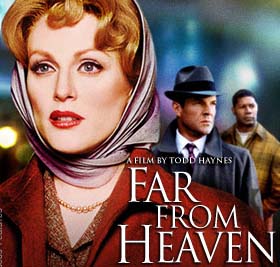|
 Frank Whitaker is an executive at advertising firm Magnatech.
His wife Cathy features in the social pages of 'Weekly Gazette', posing
in her model home. Indeed, in late 1950's Hartford Connecticut, Frank, Cathy
and their two young children lead the kind of picture-perfect life to which
the white middle classes all aspire - even Cathy's kindness to 'negroes'
is tolerated as a badge of the newly fashionable liberalism. Frank Whitaker is an executive at advertising firm Magnatech.
His wife Cathy features in the social pages of 'Weekly Gazette', posing
in her model home. Indeed, in late 1950's Hartford Connecticut, Frank, Cathy
and their two young children lead the kind of picture-perfect life to which
the white middle classes all aspire - even Cathy's kindness to 'negroes'
is tolerated as a badge of the newly fashionable liberalism.
Yet what starts with Frank returning home late from the office soon ends
with the whole fabric of the Whitaker household coming apart at the seams,
in a deconstruction of mainstream fifties values, as Frank and Cathy's
most forbidden desires bubble up from the depths to disturb the surface
calm.
In Todd Haynes' 'Far From Heaven', Dennis Quaid as Frank, and Dennis
Haysbert as the black gardener Raymond Deagan, are both excellent, but
Julianne Moore (who was offered her first ever leading role in Todd Haynes'
'Safe'), gives the real standout performance in this film as Cathy. Her
demure exterior seems to conceal unfathomable depths, and her role here
as a closeted, dissatisfied 50's housewife makes an interesting companion
piece to her similar part in 'The Hours', not least because of the very
different decisions that her character ends up making here.
Opening and closing with painted images of the autumn leaves and spring
blossoms which frame the film's events, 'Far From Heaven' is very much
concerned with colour, surface and changing times. Haynes' use of unnaturally
bright colours and immaculate design is a recreation of the 1950's not
so much as they really were, but rather as they were depicted in the technicolor
melodramas of Douglas Sirk (especially 'All That Heaven Allows'). By adopting
Sirk's stylised visual palette, but expanding Sirk's usual theme (class
prejudice) with issues which would have been strictly taboo in a fifties
film (homosexuality and race), Haynes suggests that prejudices, like the
seasons, may change their form, but never completely disappear. As Raymond
tells Cathy in a central scene where he extols the appeal of modern art:
'These colours show the same thing in different light'.
Although 'Far From Heaven' perhaps suffers from being slightly too long,
it has, like a fine painting, a glossy surface that repays a lengthy and
close viewing.
Anton Bitel, 3.3.3
|